
Margaret of Anjou crossed swords with some of 15th-century England’s most formidable warriors. But it was a playwright born eight decades after her death who inflicted the most damage on the queen’s reputation.
When William Shakespeare had Richard, Duke of York describe Margaret as the “She-wolf of France, but worse than wolves of France,” in Henry VI Part III, he helped secure the queen a place in historical infamy. For 500 years, Margaret – wife of Henry VI, and towering figure in the Wars of the Roses – has been labelled an unfaithful wife, a foreign enemy within, a Machiavellian schemer and a bloodthirsty monster who delighted in exacting terrible vengeance on her enemies. Even in modern times, some say Margaret was the inspiration for Game of Thrones’ notoriously manipulative monarch Cersei Lannister.
The truth is, inevitably, far more nuanced – and compelling – than the stereotype. Margaret was neither the unscrupulous ogre of Shakespeare’s portrayal, nor the innocent bystander that some historians have presented in recent years. She was a woman who fought with no little skill and tenacity on behalf of her husband, her son Edward of Westminster – and, of course, herself – in the maelstrom of one of England’s most protracted and vicious civil wars. She suffered setbacks and endured abuse (much of it a result of her gender) that would have broken many of her contemporaries. And yet she so nearly realised her aim of securing her son the English throne. That in itself makes her one of the most fascinating figures of the 15th century.
The route to power
هذه القصة مأخوذة من طبعة June 2023 من BBC History UK.
ابدأ النسخة التجريبية المجانية من Magzter GOLD لمدة 7 أيام للوصول إلى آلاف القصص المتميزة المنسقة وأكثر من 9,000 مجلة وصحيفة.
بالفعل مشترك ? تسجيل الدخول
هذه القصة مأخوذة من طبعة June 2023 من BBC History UK.
ابدأ النسخة التجريبية المجانية من Magzter GOLD لمدة 7 أيام للوصول إلى آلاف القصص المتميزة المنسقة وأكثر من 9,000 مجلة وصحيفة.
بالفعل مشترك? تسجيل الدخول
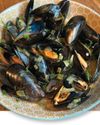
Viking mussels
ELEANOR BARNETT digs into archaeological research to recreate a Viking-cum-AngloSaxon seafood dish from medieval York
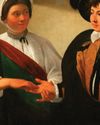
Fingers, frog's and fairies
Fortune telling was all the rage in the 16th and 17th centuries, and practitioners would stop at nothing to tap in to the supernatural. Martha McGill tells a story of Highland seers, tarot cards and encounters with the spirit world

Nothing matches being with Alexander the Great on foot in the Hindu Kush
AT OUR LITTLE FILM COMPANY, MAYA VISION, we recently took the decision to digitise all of the rushes of our key films so that we could dispose of hundreds of boxes of tapes that had been kept in storage, throwing out stuff we thought we would never need again.

Library of the dead
Highgate Cemetery, created as a fashionable resting place for wealthy Victorian dead, is a veritable who's who of London's great and good. PETER ROSS roams the avenues of this most atmospheric necropolis
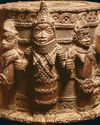
Slavery, exploitation and racism. These tragedies have long dominated histories of Africa. But there's another way to tell this story. And it's one that puts Africans right at the centre of their continent's extraordinarily rich and vibrant past
An 1414, in the Chinese city of Nanjing, a giraffe caused a stir. Amid a crowd of shocked, noble spectators, an official, leading the creature via a rope tied round its face, presented it to China's Yongle emperor. His officials said it was a qilin - an auspicious unicorn - which his sage governance had made appear.

England's forgotten hero
When the Hundred Years' War was reaching a climax, one man was fighting tenaciously to secure the English claim to the French crown. So why, asks Joanna Arman, is Henry V's formidable brother, John, Duke of Bedford, not better known?

HENRY III AND THE MAGNA CARTA THAT MATTERED
King John's sealing of a charter at Runnymede in 1215 is one of the most feted moments of the Middle Ages. Yet, writes David Carpenter, it was the charter issued by his son 10 years later that became fundamental to England's history
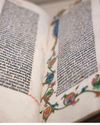
Gutenberg publishes a pioneering new book
‘The printing press triggers an information revolution
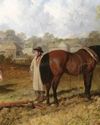
How empire ruptured rural Britain
We know that enslaved Africans and their descendants suffered in the distant colonies of empire. But, as Corinne Fowler explains, the colonial system also had dire impacts on people in the countryside of the 'motherland'
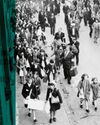
"I FELT VERY ALONE IN A WORLD GONE HORRIBLY MAD"
It was a moment of possibilities, dislocation and dread. Dan Todman tells the story of the 1.5 million urban Britons evacuated to the countryside at the start of the Second World War